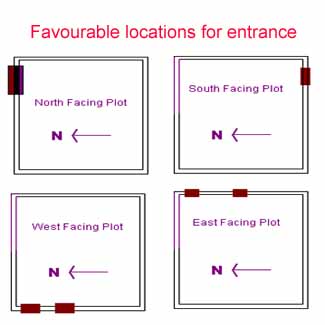The main entrance; VAASTHU A SCIENCE OF ARCHITECTURE – Part 5
Vijay Krisshnarau
There are acres and acres of land, but it is with the blessings of the Divine that we become the proud owner of either a small piece of land or a big estate. And then too, it is only in the case of a few that wherever they buy land the value appreciates at breakneck speed, within a short time, transforming them into the new maharajas. The opposite is true in the case of some others. No matter how many years have passed—it might even be generations—the value of the land remains the same. Such is their fate, maybe!
The human and the Divine
Still, we should consider ourselves fortunate to be born as human beings. Lucky or not, we could certainly improve our lot with an unfailing faith in the Divine and proper use of our brains. For, remember, if the Divine is the conductor of the bus of our life, we are its driver. We have the freedom to run it the way we want.
We cannot come up in life without hard work. We can also ensure that we get the proper result for our hard work by selecting the right piece of land and building a house on it, in consonance with the principles of Vaasthu. There is nothing wrong in harnessing the Panchabhoothas to the extent possible. And it is no idle superstition either, for, after all, the five elements are the basis of Vaasthu Shaastra.
Water in the right place can be found in plenty. Air will flow in from the right direction. And so it is with fire and light. So, what is wrong when we are advised not to build something that acts as a deterrent to the free play of these forces? There is nothing superstitious in this.
If Vaasthu decrees that certain objects that burden the earth should be discarded, it does so for our safety only. Don’t we avoid staying for long in a place that smells foul? So too will prosperity elude us in a house which defies the principles of Vaasthu.
Not only that. If a house is built strictly in consonance with Vaasthu, it will stand out in beauty, even if the building is a small one. There will be peace and harmony in the dweller’s life. And if the building were to be facing either the north or the east, his cup of happiness will be filled to the brim.
The problem of the west
It is fine to own a piece of land, wherever it is, or in whichever direction it lies, maintain some. Only the building has to be built according to the principles of Vaasthu, they aver. If that is so, why does fortune not unleash itself in all its glory in a house facing west, like it does in the case of a house facing the north, east or even the south?
The West-facing house would have been built fully in consonance with Vaasthu principles, yet there is some force that prevents its owner from realizing his full potential.
The question might arise: aren’t many well-known and fortunate people living in houses facing west? Yes, but the benefits would have been much more if their houses faced the north, east or the south.
There is a general impression that Vaasthu, or for that matter, manayadi shaastra, (though both are one and the same) is an expensive exercise. There is also a feeling that Vaasthu applies only to house owners, and that too of independent houses. How could one apply Vaasthu to that hugely popular and modern way of living: apartments?
 For that reason, Vaasthu cannot be twisted to suit any shape. Fate can be overcome by intelligence, says an adage. Yet, the overbearing figure of fate cannot be thrust aside. “Whatever happened is for the good. Whatever is happening is for the good. Whatever happens is for the good,” says the Bhagavad-Gita. This is a truth which transcends all known religious dictums. Even the smallest work cannot be accomplished without nature’s collaboration. Nature’s role is evident even in the greatest inventions of man. It could have been in the form of water, air, fire, plant or trees, stone, vegetable or fruit, or for that matter soil itself. Nature is involved in some way.
For that reason, Vaasthu cannot be twisted to suit any shape. Fate can be overcome by intelligence, says an adage. Yet, the overbearing figure of fate cannot be thrust aside. “Whatever happened is for the good. Whatever is happening is for the good. Whatever happens is for the good,” says the Bhagavad-Gita. This is a truth which transcends all known religious dictums. Even the smallest work cannot be accomplished without nature’s collaboration. Nature’s role is evident even in the greatest inventions of man. It could have been in the form of water, air, fire, plant or trees, stone, vegetable or fruit, or for that matter soil itself. Nature is involved in some way.
Since nature is behind all human accomplishments, is it not logical that we should make use of the natural elements in our building technology? This, precisely, is what Vaasthu teaches us.
Rented accommodation
Before we proceed any further, let us at the outset clear this often-heard plea of tenants that they have nothing to do with Vaasthu or its consequences, since they are merely the temporary occupants of a house owned by somebody else. Fine, let us assume for a moment that, while in a foreign country, we find ourselves in the midst of a natural catastrophe like a hurricane or an earthquake. Can we escape nature’s fury by pleading that we should be exempted from its consequences because we do not belong to that country? All who are there at the moment are likely to be affected, whether native or foreign. Much in the same way, can we claim that Vaasthu is irrelevant to us since we live in a rented house?
Still, we are aware that a tenant does not have the same right as the owner to alter the house at his sweet will, Vaasthu or no Vaasthu. We will, therefore, explain an alternative remedy for those living in rented houses, which have not been built according to Vaasthu.
We will begin with those in search of rented accommodation. The main entrance to a house is what the face is to the body. The preferred and, Vaasthu-wise, ideal location is the northeast. We call this the Eesaana corner. There can be no better entrance to a house than this junction. If the house is facing north, the entrance should ideally be located in the northeastern corner. This would be particularly propitious to women. It would add lustre to the body, remove all impediments to marriage, control the malefic elements in their horoscope and get them married to loving grooms. It would enable them to lead a happy married life, bestow them with children, good education and good health. It would also shower on them wealth and influence, and, if they are employed, considerably improve their career prospects.
If it is not possible to have the main entrance in the northeastern corner, then opt for the north-centre.
However, the northwestern side is not recommended since the wind (Vaayu) is identified with this direction. Disastrous consequences are indicated in the form of ill-health and litigation. Hard work is also indicated, but the yield would be very ordinary. Businessmen running small businesses would have to work twice as hard as successful owners of large enterprises. The returns, though, would be meagre. It is also likely that the householder would be trapped in a business about which he knows very little. To sum up, it is not at all advisable for north-facing houses to have the entrance in the northwestern corner, as this is the home of the wind element.
If the building is facing east, the main entrance at the northeastern corner is very propitious to men.
(Continue)
© 2011 bhakthiplanet.com All Rights Reserved

















Great post. I was checking continuously this blog and I’m impressed! Very helpful info specially the last part 🙂 I care for such info much. I was looking for this certain information for a very long time. Thank you and good luck.